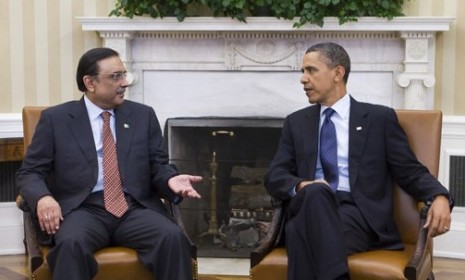The strained U.S.-Pakistan relationship: 4 predictions
The circumstances surrounding bin Laden's death have increased tensions between Washington and Islamabad. What's next for this troubled diplomatic partnership?

The raid that killed Osama bin Laden has strained the relationship between the U.S. and Pakistan. The Obama administration wants to know how the world's most wanted terrorist could have hidden, apparently for years, in a town crawling with members of Pakistan's military. Pakistani Prime Minister Yousaf Raza Gilani is trying to get Washington to accept part of the blame, saying that the intelligence failure was made by "the whole world, not Pakistan alone." But what do the circumstances of bin Laden's demise mean for the already troubled relationship between the U.S. and Pakistan? Here, four theories:
1. The U.S. will step up strikes in Pakistan
The location of bin Laden's cozy hideout "demonstrates the complicity of the Pakistani government," says Bing West at National Review. Islamabad is clearly embarrassed, with good reason, and it "will scramble to excuse its hypocrisy." Meanwhile, "the U.S. military, if the White House seizes the moment," now has the justification and credibility it needs "to step up attacks against other terrorists inside Pakistan, especially along the Afghan border."
The Week
Escape your echo chamber. Get the facts behind the news, plus analysis from multiple perspectives.

Sign up for The Week's Free Newsletters
From our morning news briefing to a weekly Good News Newsletter, get the best of The Week delivered directly to your inbox.
From our morning news briefing to a weekly Good News Newsletter, get the best of The Week delivered directly to your inbox.
2. Obama will demand better cooperation
Pakistan's president, Asif Ali Zardari, has been reduced to writing an op-ed in The Washington Post, says John R. Guardiano at The American Spectator, begging Americans to believe his country isn't knowingly harboring terrorists. This is the ideal moment to stamp out "Pakistani double-dealing and complicity" once and for all. President Obama now has the moral and political authority to press for "more tangible action" by Pakistan's intelligence service and military in the fight against al Qaeda and the Taliban.
3. Pakistan's government will be weakened domestically, too
Most Pakistanis don't identify with al Qaeda, says Lt. Gen. Hamid Gul, former head of Pakistan's intelligence agency, as quoted by Reuters. That means public demonstrations of anger at bin Laden's death will be limited. But the people are not happy that their government is busy making excuses to the U.S. instead of protesting the violation of Pakistan's sovereignty by the U.S. commandos who conducted the raid. "That's an affront to a nation of 180 million people," says Gul. "The people of Pakistan are very angry with their military that they have sold us" to the Americans.
A free daily email with the biggest news stories of the day – and the best features from TheWeek.com
4. Any hope of improved relations will fade
Two years ago, it seemed likely that our diplomatic ties would improve as the seemingly open-minded Barack Obama replaced "the insular George W. Bush," says Zafar Hilaly in Pakistan's The News. But things looks different now. "The psychological blows cast by the circumstances of Osama's discovery and death" will only intensify the issues that made the U.S.-Pakistan relationship tense in the first place, "such as the use of drones and Special Operations forays." If Pakistan continues to resist driving al Qaeda and the Taliban out of North Waziristan, the U.S. military is sure to barge in and do it over Pakistan's objections. Clearly, "stormy conditions lie ahead."
-
 Europe’s apples are peppered with toxic pesticides
Europe’s apples are peppered with toxic pesticidesUnder the Radar Campaign groups say existing EU regulations don’t account for risk of ‘cocktail effect’
-
 Political cartoons for February 1
Political cartoons for February 1Cartoons Sunday's political cartoons include Tom Homan's offer, the Fox News filter, and more
-
 Will SpaceX, OpenAI and Anthropic make 2026 the year of mega tech listings?
Will SpaceX, OpenAI and Anthropic make 2026 the year of mega tech listings?In Depth SpaceX float may come as soon as this year, and would be the largest IPO in history